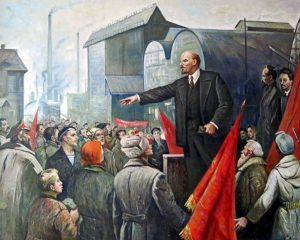Guest Post by Eric Peters

Well, I’m a day late with this – but I wanted to extend my best wishes to everyone for the Thanksgiving holiday. Which holiday, as I’m sure most of the veterans here already know, wasn’t conceived as a celebration of random plenty but rather as a repudiation of collectivism.
The pilgrim’s colony had been based on the same economic (and moral) ideas that Lenin had – and implemented – in Bolshevized Russia at the beginning of the last century. Bad ideas having a strange ability to endure.
Anyhow, the Pilgrims – like the Russians – starved. There was cannibalism. Because of the doctrine: From each according to his ability, to each according to his need. Strictly enforced, by commissars.
People tend to shirk work when there is no benefit to them; when they become the mules for those who don’t work.
It happened at Plymouth and it happened in St. Petersburg.
The Pilgrims learned faster. They abandoned communism and in short order, people stopped starving because they had reason to work. That reason being, their work meant they would eat (as opposed to their work providing food for others to eat).
But this true message of Thanksgiving is lost on people today – probably because it is not taught today. Instead, the holiday is an excuse to gorge and drink and watch fuuuuuuhhhhhhhhhhhhhhtttttttttball.
It is no longer the valuable teaching moment it was meant to be – and ought still to be.
And because it is not, the same insane idea that those who don’t work are entitled to eat – and those who do work are obligated to turn over the fruits of their labor to those who do not – has taken firm root once again.
It is why so many believe they have a right to health care – i.e., to force other to provide it, though this is never stated so honestly. And “free” education. A “living” wage.
It is why Ilych came to power in Russia 100 years ago – and thus consigned millions to their deaths.
And it is why it will happen again, here, if the message of Plymouth Colony isn’t heard and understood before it’s too late.




“Because of the doctrine: From each according to his ability, to each according to his need.”
First stated in Acts chapter 4. How do people not fathom the implications of this? Following Christ literally. What went wrong?
The pilgrims starved. Modern man believes utopia will follow.
one of the few x i’ve wished peters had been more wordy–
most people on this site know the real story of t’giving but people reading it on other sites might not–
There is a major difference though: starving to death tens of millions of Christians was intentional on the part of the Bolsheviks. The pilgrim leaders, on the other hand, were just misguided.
Sorry to say that it’s too late. When society makes decisions on feelings instead of facts and reason the gig is up. Until people feel the pain – just like the Pilgrims did, they are unlikely to change.
Every Thanksgiving someone trots out the “Pilgrims were communists” line. The story goes like this, when they arrived in North America they shared everything so they were communists, and they starved. Then they embraced capitalism and prospered. Don’t bother telling them that Karl Marx wasn’t born until 1818, and Adam Smith wouldn’t show up to tell us about capitalism for another hundred years.
But there is an element of truth to the fable. In a practice they called The Common Course and Condition, they did share everything when they arrived in 1620. What he left out of the narrative is that they arrived in November (i.e. winter). Not just any winter, 1620 & 1621 were in a period climatologists call “The Little Ice Age.” The Pilgrims’ first winter in North America was brutal. They had no choice but to share. All they had to live on was the meager rations they brought from England and the corn they stole from the Native Americans.
Their harvest in 1621 was successful enough that they celebrated with a feast we call Thanksgiving. After the feast, an inventory was done and they realized they had greatly overestimated the harvest. They had to cut food rations to get through the winter of 1621-1622. Here’s is where it gets complicated. By the first Thanksgiving, half of the colonists had died in the “Great Sickness”. Only four women survived to see Thanksgiving. Right after Thanksgiving 1621, the ship Fortune arrives with 35 new colonists (only three were women). At this point there are seven women doing laundry for about eighty-five colonists. The seven women complained about doing laundry for all the bachelors. It was at this point that individual plots were assigned, and everyone started to make their own way.
They shared when they had to in order to survive, and they “went capitalist” when they were settled in with a full planting/harvesting season ahead of them. In the end, it had as much to do with laundry as it did with economics.